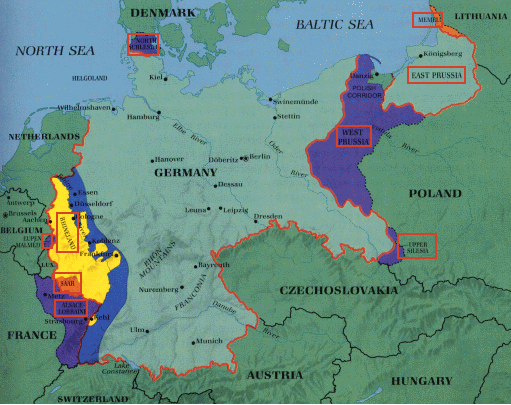

The dotted line shows the old frontiers of Imperial Germany at the start of World War I in 1914.
The Versailles Treaty assigned the old borders of the 19th century German Confederation to be Germany's new frontiers.
Move the cursor over the red squares to learn more.
Or go to the Versailles Treaty homepage.
According to Mr. Manfred Rommel, his father Field Marshal Erwin Rommel, "like all other Germans" bitterly resented the "unfair and humiliating" terms of the Paris Peace Treaty that the delegates of the nascent Weimar Republic were forced to sign in the Hall of Mirrors in the palace of Versailles in 1919.
The effect and consequences of Versailles upon Germany and its population are eloquently portrayed by historian David Fraser in his biography of Erwin Rommel "Knight's Cross". In this brief excerpt from his book, Fraser outlines the terms of Versailles and then describes how a comparable treaty would have affected the British Empire had the tables been turned and Britain been defeated by Germany in WWI and forced by Germany to sign a Versailles-like treaty.
![]() The Armistice and the Versailles Treaty provided
for the occupation of the western regions of Germany; enormous (and unpayable
reparations); the emasculation of Germany as a military power; the surrender of
a large part of the German High Seas Fleet; acceptance by Germany of certain
self-accusatory clauses admitting guilt for the war; and vast territorial losses
- Alsace and Lorraine to France and the Eastern provinces to a resurrected state
of Poland. ....
The Armistice and the Versailles Treaty provided
for the occupation of the western regions of Germany; enormous (and unpayable
reparations); the emasculation of Germany as a military power; the surrender of
a large part of the German High Seas Fleet; acceptance by Germany of certain
self-accusatory clauses admitting guilt for the war; and vast territorial losses
- Alsace and Lorraine to France and the Eastern provinces to a resurrected state
of Poland. ....
The Hohenzollern and Hapsburg empires vanished. The concert of Europe, destroyed by the outbreak and savagery of the war, was succeeded by economic and political instability and widespread dissatisfaction over the new frontiers. While the Russian Bolshevik experiment was attempted in other countries, what lingered on was the bitter resentment of the defeated. ....
Nor did humiliations stop at that point. An Allied note of February 1920 demanded the surrender of various "war criminals". The list (described as "not final") included the German Crown Prince and two of his brothers, Duke Albrecht of Wurttemberg, Crown Prince Rupprecht of Bavaria, Field Marshals von Hindenburg and von Mackensen, Grand Admiral Tirpitz, General Ludendorff, former chancellors Bethmann-Hollwegg and Michaelis, and 900 other officers and non-commissioned officers. In this international sludge of resentment and instability the German Weimar Republic was born.
The reactions and emotions of a patriotic young German officer of Erwin's Rommel's generation can be imagined by a foreigner if, for instance, a comparable British military defeat be supposed - defeat after a long painful struggle, with the losses of Loos, the Somme, Third Ypres and so forth echoing in every British mind and home.
The maritime counties dominating the Channel and providing the Fleet bases most contiguous to Europe - Kent, Sussex, Hampshire, Dorset, Devon - would have been garrisoned by the victorious enemy. The British African colonies would have been assigned to German protection; and to a resurrected Norse Land in alliance with Germany would have been transferred the northern and western parts of Scotland, beyond the Tay and the Clyde. The Royal Navy, confined to bases on the North and Irish Seas, would have been magnanimously allowed a continued existence, but forbidden to build any new ships over 10,000 tons, and absolutely forbidden the construction of submarines or the development of naval aviation.
On top of all of this, the British monarchy would have been deposed. The demand for surrender to the Germans of field marshals, admirals, and generals - Haig, Plummer, Allenby, Jellicoe, and others including many juniors; the imposition of a reformed electoral system; and certain measures aimed at decisively weakening the influence of London as a financial center, succeeded by economic disaster and social unrest. (Fraser, 83-84).